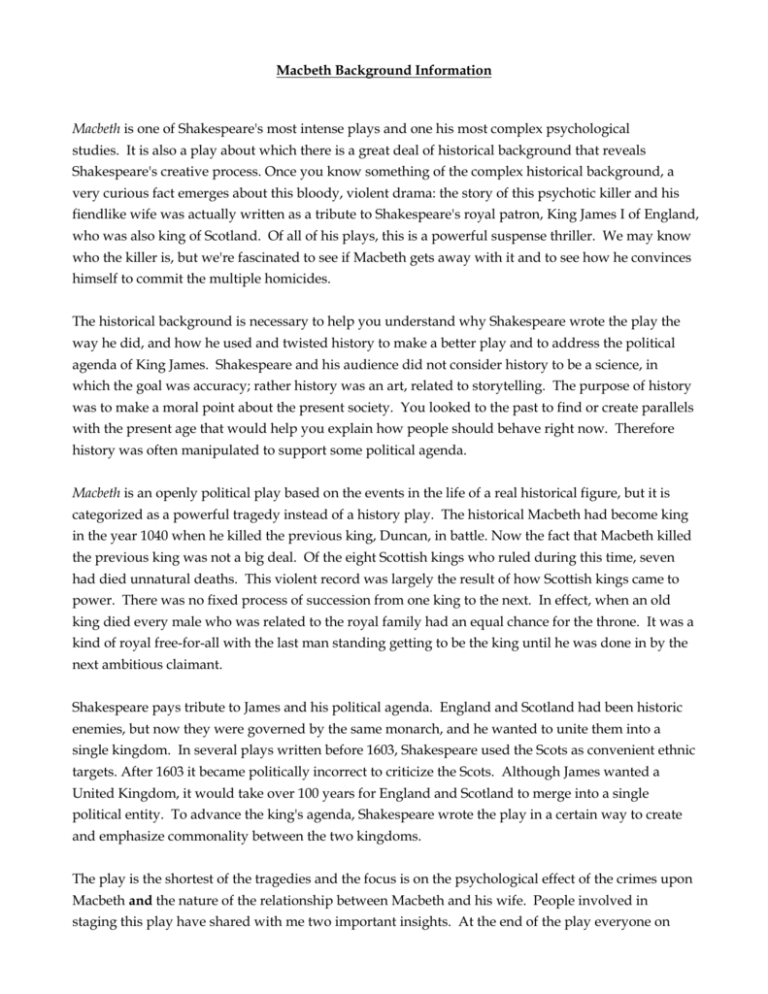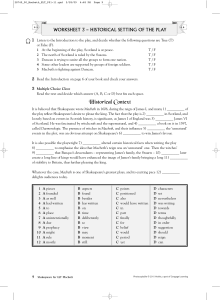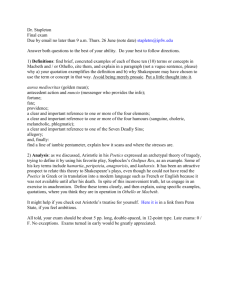Macbeth Background Information
advertisement

Macbeth Background Information Macbeth is one of Shakespeare's most intense plays and one his most complex psychological studies. It is also a play about which there is a great deal of historical background that reveals Shakespeare's creative process. Once you know something of the complex historical background, a very curious fact emerges about this bloody, violent drama: the story of this psychotic killer and his fiendlike wife was actually written as a tribute to Shakespeare's royal patron, King James I of England, who was also king of Scotland. Of all of his plays, this is a powerful suspense thriller. We may know who the killer is, but we're fascinated to see if Macbeth gets away with it and to see how he convinces himself to commit the multiple homicides. The historical background is necessary to help you understand why Shakespeare wrote the play the way he did, and how he used and twisted history to make a better play and to address the political agenda of King James. Shakespeare and his audience did not consider history to be a science, in which the goal was accuracy; rather history was an art, related to storytelling. The purpose of history was to make a moral point about the present society. You looked to the past to find or create parallels with the present age that would help you explain how people should behave right now. Therefore history was often manipulated to support some political agenda. Macbeth is an openly political play based on the events in the life of a real historical figure, but it is categorized as a powerful tragedy instead of a history play. The historical Macbeth had become king in the year 1040 when he killed the previous king, Duncan, in battle. Now the fact that Macbeth killed the previous king was not a big deal. Of the eight Scottish kings who ruled during this time, seven had died unnatural deaths. This violent record was largely the result of how Scottish kings came to power. There was no fixed process of succession from one king to the next. In effect, when an old king died every male who was related to the royal family had an equal chance for the throne. It was a kind of royal free-for-all with the last man standing getting to be the king until he was done in by the next ambitious claimant. Shakespeare pays tribute to James and his political agenda. England and Scotland had been historic enemies, but now they were governed by the same monarch, and he wanted to unite them into a single kingdom. In several plays written before 1603, Shakespeare used the Scots as convenient ethnic targets. After 1603 it became politically incorrect to criticize the Scots. Although James wanted a United Kingdom, it would take over 100 years for England and Scotland to merge into a single political entity. To advance the king's agenda, Shakespeare wrote the play in a certain way to create and emphasize commonality between the two kingdoms. The play is the shortest of the tragedies and the focus is on the psychological effect of the crimes upon Macbeth and the nature of the relationship between Macbeth and his wife. People involved in staging this play have shared with me two important insights. At the end of the play everyone on stage cheers the death of the tyrant Macbeth; if the production has been successful, the audience doesn't cheer (they sympathize with Macbeth). The second insight is about the relationship between Macbeth and his wife. They are a lot like other famous criminal couples: Each one of these people alone is incapable of committing real evil, but together they form a symbiotic relationship in which each supplies psychologically what the other lacked becoming a deadly combination. For most audiences the witches are the most spectacular element of the play, along with the ghost of Banquo. The witches in Macbeth were apparently very authentic, based on the folklore of witchcraft Shakespeare learned about growing up in Stratford. Over the years a very powerful superstition arose about Macbeth in the theater: strange things happened whenever you performed the play, so that in the English theater in particular you were forbidden to use the name of the play within the theater. Actors would refer to it as "the Scottish tragedy." Macbeth Anticipation Guide Answer each question honestly. Please explain your answer whenever possible 1. Have you ever given in to temptation? 2. Do you believe in prophecies? (A prediction that something will occur in the future) 3. How do you decide what is good and what is evil? 5. What is the difference between greed and ambition? 6. Do you believe the adage, "You reap what you sow?" (aka - "You harvest what you plant?") 7. Do you believe that fate directs our lives or that our actions alone determine our circumstances? 8. You probably would not break your moral code for a stranger, but what about for a loved one? 9. If someone prophesied you would become someone of importance (what you dream of being) would you wait for it to happen or would you try to make it happen? Explain. 10. Do you listen to your conscience? 11. Have you ever experienced the feeling of guilt? What did you do about it?





